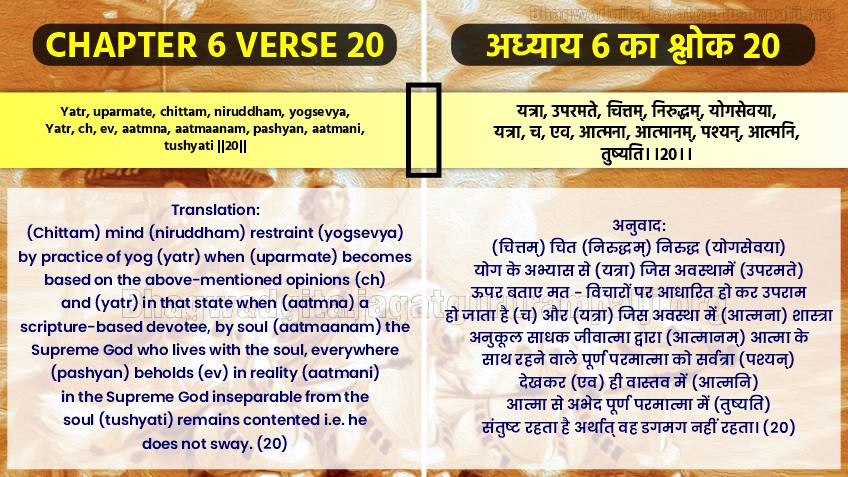
Yatr, uparmate, chittam, niruddham, yogsevya,
Yatr, ch, ev, aatmna, aatmaanam, pashyan, aatmani, tushyati ||20||
Translation: (Chittam) mind (niruddham) restraint (yogsevya) by practice of yog (yatr) when (uparmate) becomes based on the above-mentioned opinions (ch) and (yatr) in that state when (aatmna) a scripture-based devotee, by soul (aatmaanam) the Supreme God who lives with the soul, everywhere (pashyan) beholds (ev) in reality (aatmani) in the Supreme God inseparable from the soul (tushyati) remains contented i.e. he does not sway. (20)
Translation
When the mind, by practice of restraint yog, becomes based on the above-mentioned opinions and when a scripture-based devotee on seeing the Supreme God, who lives with the soul, everywhere by his soul, in reality remains contented in that Supreme God inseparable from the soul i.e. he does not sway.
यत्रा, उपरमते, चित्तम्, निरुद्धम्, योगसेवया,
यत्रा, च, एव, आत्मना, आत्मानम्, पश्यन्, आत्मनि, तुष्यति।।20।।
अनुवाद: (चित्तम्) चित (निरुद्धम्) निरुद्ध (योगसेवया) योगके अभ्याससे (यत्रा) जिस अवस्थामें (उपरमते) ऊपर बताए मत - विचारों पर आधारित हो कर उपराम हो जाता है (च) और (यत्रा) जिस अवस्थामें (आत्मना) शास्त्रा अनुकूल साधक जीवात्मा द्वारा (आत्मानम्) आत्मा के साथ रहने वाले पूर्ण परमात्मा को सर्वत्रा (पश्यन्) देखकर (एव) ही वास्तव में (आत्मनि) आत्मा से अभेद पूर्ण परमात्मा में (तुष्यति) संतुष्ट रहता है अर्थात् वह डगमग नहीं रहता। (20)
